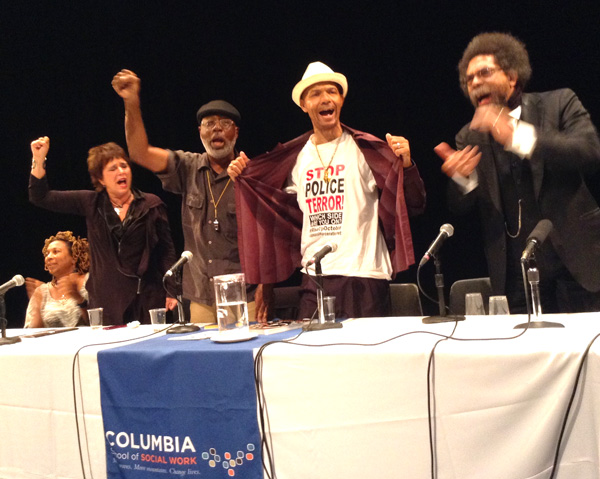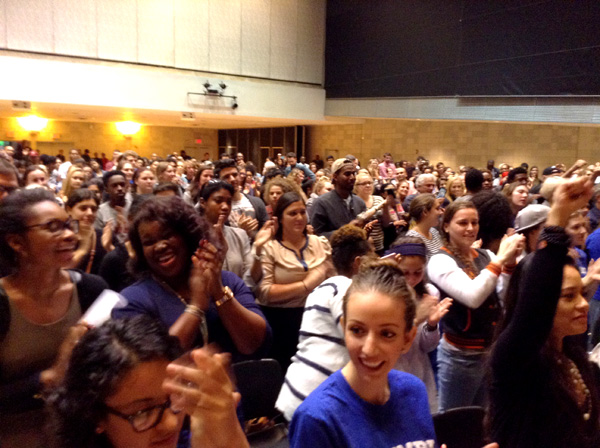Some Lessons in Building the Rise Up October Event at Columbia University
by A Revolutionary Volunteer for #RiseUpOctober
October 11, 2015 | Revolution Newspaper | revcom.us
There was a down-to-the-wire battle to hold a major and very successful Rise Up October mobilizing and organizing event of 550 people, largely Columbia University students, on the Columbia campus in NYC on October 7. (Watch the video of the event, read the speech by Carl Dix “I don’t want to keep making hashtags!” and “A Challenge to Columbia University Students and the World.”)
Watch the entire event here
Many factors came together to make the event at Columbia happen. Most fundamentally, there is the actual epidemic of police terror and the fact that ever since the uprising in Ferguson, Missouri, after the police murder of Mike Brown (and leading up to that) there has been a mood and attitude among those literally “under the gun” of police terror to not take it anymore. And large sections of society have been forced to confront—to different degrees and in different ways—what to do about this. But we had to start from this basis and then do work to unlock the potential for students to take up Rise Up October. And there was also the fact that the Columbia administration “helped us out” by trying to censor the event. I’m not making light of that—it was an outrageous move to ban serious engagement with police brutality and murder on campus, and came close to shutting down what turned out to be a tremendous thing. But because people did not back down, and instead made the university’s interference and censorship a big issue on campus—and as university’s role was getting more and more exposed—the event became a bigger deal and more students built for it, made it happen, came to it, and got organized for Rise Up October.
A student interviewed in Revolution described changes she and others went through: “This is how it happened: We raised more awareness. It had to get political. And we got it. It was a lot of student-led advocating, and we don’t often do that but this time we had to. And there needs to be more of that.” And she emphasized: “It doesn’t stop here. This event has to happen because on October 24, it’s gonna be a broader scale, we’re gonna shut down New York City to raise awareness for all those affected by police brutality. So it goes beyond here.... This is continuing for the month of October.”
Making this event happen also required radical transformations in how those of us in the movement for revolution approached playing our role. Within this bigger picture, that’s mainly what my letter is about: to share what we learned and how we changed our thinking and approach. And I’m sharing this to contribute to the breakthroughs we need to make between now and October 22, 23, and especially the massive mobilization in NYC on October 24.
Non-Linear Approach
As part of the national student task force for #RiseUpOctober, we know how important a campus like Columbia University has been throughout NYC and across society. A couple weeks back we knew we could bring together an incredible lineup of speakers that students could engage with as part of organizing for #RiseUpOctober, the big three days of protest and resistance against police murder and terror coming up in New York on October 22-24.
But at first we only knew a few students there. We had trouble getting a room from the start. In fact the administration only gave permission for a venue a little more than 24 hours before the event! Still, that night, more than 550 people came out to hear this program, students emceed, took responsibility for the integrity of the event, organized. At the end of the night over 120 people signed up to organize or support #RiseUpOctober.
So, how’d it happen?
A couple weeks ago a young woman contacted #RiseUpOctober wanting to organize a program on the Columbia/Barnard campus. She immediately contacted all the necessary channels and was given the runaround in booking a large venue. Some of us who had just come to town to volunteer with #RiseUpOctober, along with a couple of young comrades in New York, plunged in to help. We worked with several other students to try to book a venue that could fit a sizable audience. And at every turn, we were given multiple excuses: “Oh, you didn’t fill out the right paperwork,” “Oh, you need student organization credentials,” “Oh, your paperwork is too late,” etc. At a certain point we were getting so self-consumed with the bureaucracy that we had to take a step back. In addition, this approach was reflective of how we usually plan programs: we book a room, then we create mass public opinion, and then we try to organize people off programs.
Instead, we tried something new!
First, we went back to re-root ourselves in reality—that the oppression of Black and other oppressed nationality people is a huge outrageous crime of this system... but that this whole system sits on a very unstable foundation and while there’s a lot of shit that’s getting pumped at people to go back to “business as usual,” there’s a deep swelling anger that has to get unleashed and organized. We were getting lost in the organizing of an “event” instead of starting from the basis and necessity, and then coming from that finding and seizing on every opportunity from which to bring forward and organize students for #RiseUpOctober with this program being a key way to do that. We had to keep reminding ourselves—we are not “a handful of people coming in from the outside,” we represent a whole different world and in this particular case we are speaking for the people whose faces are on that Stolen Lives poster, along with many, many others who are locked down, terrorized, abused, bullied, beaten, and raped by this system and its enforcers.
We knew this program had to happen. So we quickly changed our approach and put resolving this contradiction before the students we were working with and the entire student body. Together we went out with a large display with the list of speakers and called on students to make this event happen. We were very bold as to why students needed to hear from these speakers at this time and in this moment. And this had a reverberating effect. Students began to get into motion demanding a room. Professors got emailed; administrators’ doors were knocked; students were introducing us to all types of different networks.
But still no room. Some of the students were getting discouraged and even our team was feeling the effect. But instead of caving in, we went even further. We released a flyer stating how the administration was preventing students from hearing from these speakers. The flyer included a letter from a PhD student who wrote: “It is unconscionable for Columbia University to remain institutionally and formally silent about the huge movement that is coming together for Rise Up October, to protest against police brutality and mass incarceration, especially when members of our own faculty are prepared to speak up in a public setting.”
Along with this flyer, we saturated campus with palm cards for #RiseUpOctober because while there was a lot of favorable opinion amongst the student body to have this program, there was a bit of a disconnect with the reality of this genocide—so that opinion needed to be strengthened into partisanship based on the reality of what is going on. So the new palm card with the faces of those who’ve been killed at the hands of the police was broadly distributed. The team on the campus really tried to get into and apply the agitation modeled in the article “Then Would You Call It Genocide?” which is posted at revcom.us. And let me emphasize—anyone can do that.
We bumped into one of the speakers on campus and informed the other speakers of the difficulty students were having in booking a room. They all agreed this program had to happen and agreed to do it on the steps of the campus—which a lot of students were very enthusiastic about because of its defiance and also its seriousness in posing the question: “Which Side Are You On? STOP Police Terror.” So we made sure to make this known; we started to publicize a time and a place to gather—with or without a room—even as we continued to go out very broadly to make it known that the university was blocking all efforts to have these speakers speak to students about police murder and white supremacy.
Heading into the weekend of October 3-4, we still didn’t have a room. While we were beginning to build public opinion on this program, we had to do more and we worked to put the battle for a room in the context of everything we were aiming to accomplish in October.
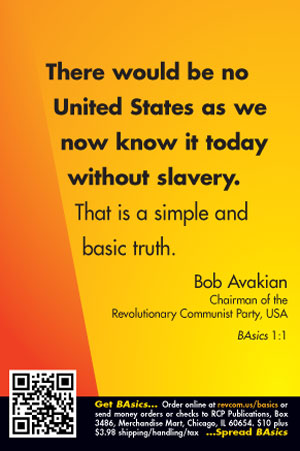
Some of the students we were in the mix with were people who already knew each other and were working hard on this, bringing all kinds of their ties to bear. Others were new to things. We in the movement for revolution had to make changes in the “culture” of how we do things “on the spot”—and not off to the side of things—so in different ways, on different levels, we were all going through changes together in order to win the fight for a venue and make the event a success. For instance, our team had a met a student on the train who joined up with us. When I arrived to give an orientation, it seemed everyone had been talking for some time. I knew I had to intervene to get our team continuing to go out very boldly because while we could have just sat there for hours having really good discussions, we couldn’t afford to lose sight of the big fight we had to wage right then. I invited the student we just met to be part of our orientation. I drew from “Which Side Are You On? Why There Must Be a Truly MASSIVE Outpouring Against Police Murder on October 24 and Why YOU Are Needed.” In addition, I used BAsics 1:1 to speak to the reality of Amerikkka and I spoke to the need for revolution and why the revcoms [revolutionary communists] have to be proceeding with the orientation of Fight the Power, and Transform the People, for Revolution. All this seemed to come off as a very alternative discussion for this student (in a good way). This student spoke to how in this country Black people have never been given rights and talked some of how that’s manifested from slavery to the new Jim Crow. They were very powerful comments.
As part of our orientation we made beginning concrete plans. We started a petition (and another student started a petition online) and continued to saturate the campus with a flyer that more explicitly stated that the administration was blocking students the opportunity to hear this program and challenged them to do otherwise. The petition was used as a way to involve many more students in the process of seeing the importance of this program and why their participation was key. This student seemed inspired and went to quickly draft the petition and we divided up into teams. He joined a team even as he was of two minds whether Columbia students were really interested in the topic. This itself contains a lesson—students who DO care come to feel isolated; but when a force steps out in a bold way to really challenge the students, and make the terms of the fight clear, they find that they can bring out a different side of their fellow students.
After this outing this student made the following statement: “Mass incarceration and police brutality continue to be a major issue in minority communities. It’s up to us as a people to start banding together and address these issues at hand. So come out, and help to support the launch of events to stop police terror taking place on October 7. We need support from students, staff members, members of the community to help this event get pushed forward, and would really appreciate your support. So contact us, reach out, assemble, protest, agitate, and let’s just help all of this go through.”
Afterwards I summed up that this had to be our approach. We had to work even more closely with the students we were meeting and/or already working with in fighting to book a room. We had to unleash them amongst their peers in ways that were meaningful and part of stepping into a process of doing things they’ve never done before. So with that orientation, our team met up with another student and took a similar approach. I think the other volunteers may have been a bit taken back on how enthusiastically the student took up the challenge to get out there and struggle with others. This student came to life and challenged students to step forward and be part of stopping this New Jim Crow... and this was just the beginning of the process as he further built off of that leading into October 7.
Working with students all the way through
On Tuesday morning, we got a call about meeting with a top administrator who wanted to meet the students organizing October 7. We quickly called around with news of this development. Four students stopped everything they were doing and gathered up. This was the first time they all met each other (even as they’d been following each other’s work online and on social media). We had to give a quick orientation of what we just accomplished and were beginning to bring forward. We put it back to them. We said something along the lines of “This is an indication of the power you have in stepping forward to change everything and you have to sit in that understanding and carry that confidence that what we’ve begun to do can have a MAJOR effect!” They all looked at each other with joy and seemed geared up for this meeting. We made clear that they were responsible for making this program happen and that we’d play a more secondary role and only intervene if necessary. They were nervous but seemed prepared for this challenge.
At the meeting, the administration stopped putting up bureaucratic obstacles and the necessary paperwork was completed. While it was never said, the struggle waged by students and the defiance of the panelists determined to speak to the Columbia student body was clearly the driving factor in this 180-degree turnaround. Immediately we went into motion, and near the end of the day we were given the largest room on campus! There was a collective joy that we won this battle, but we quickly realized this was only the beginning. We had to quickly get into gear and further wield and mobilize every positive factor to make this program a success.
Not losing sight of the bigger picture
All that I’m describing above went by very quickly, but we struggled to never lose sight of the bigger picture; in other words for whom are we doing all this and why it matters. Before our very important meeting with the administration, we were briefly getting to know each other (since some of us had never met). A young woman was getting ready to travel to Germany and we began to reflect on the Syrian refugee EMERGENCY. This opened up a brief discussion on Bob Avakian’s (BA) point of “Why do people come here from all over the world...” which people were very much in agreement with. After our very important meeting some of us sat together waiting in anticipation. A TA [teaching assistant] was grading paperwork and we were reflecting on how closely framed the educational system really is. Nowadays students don’t read whole books for classes, they are assigned excerpts from books and discussions are framed with getting the essence of articles—but you don’t really get to discuss whether what’s being argued is true or not and whether it corresponds to reality.
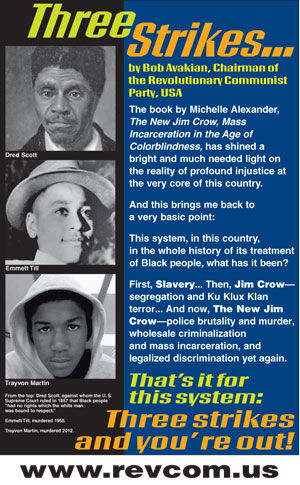
As we continued to wait, CNN played in the background and headline news talked about a police chief weeping over the death of an infant (not that the death of an infant is not tragic). but the question got posed why is this headline news? This just takes one isolated thing to conceal the real nature of the police. From there we got into the science of the oppression of Black people by walking through BA’s “Three Strikes” quote. While this student was familiar with pieces of the puzzle, this analysis seemed very new. We didn’t directly speak to the headline news, but it was an important opportunity to further frame the importance of everything we’re doing and further speak to the complexity of this system having no future for the masses of youth.
A room is booked! But still not losing sight of why we’re doing all this
With a lot of enthusiasm and joy we stepped up to the challenge to let EVERYBODY know of this program (in 24 hours). The sponsoring organizations made sure to email, FB message, talk to, flyer every single individual and organization they could possibly imagine. The #RiseUpOctober national student task force called on everyone to reach out to all their networks (since this program could be seen by all with Internet access) and build for the event at Columbia U all day. A couple students from different campuses and Columbia U students were among those who, throughout the day, got out thousands of flyers. There was agitation coming from many different directions and our small team was not afraid to step on people’s toes. Everyone brought out the best in each other to make it known to the student body that a room was booked and they were being recruited to build for it. Many students were happy to know that a room was booked and took stacks of flyers to their classes, dorms, etc. This team was determined to sharply polarize the campus with Which Side Are You On? Stop Police Terror as part of building for this program (and they had a lot of fun doing so).
I was responsible for a lot of the coordination. I met with the sponsoring organizations and they were in full gear to make this program a success. They were very nervous because they’d never done something like this on such short notice (and really neither had I). We all worked all the way through to not lose sight of the importance of #RiseUpOctober. They strove to proceed from the fact that they were the new freedom fighters taking the stage and they had to sit with the importance of what they were opening up to the entire student body AND that they not lose sight of the reality: of the thousands taken from us at the hands of the police and the need to STOP Police Terror. With that, we went forward and even though all the pieces weren’t neatly organized, we divided up leadership responsibilities and relied on our collectivity.
Before the doors opened, a line began to form. There was a lot of enthusiasm and excitement and everybody in that room was challenged to actively take part in #RiseUpOctober. I’m not going to try and capture all that came together. EVERYONE should watch the video: gather groupings of people and WATCH—especially all the speakers’ opening remarks (even as the entire program was a process in itself).
Really what’s your life going to be about?
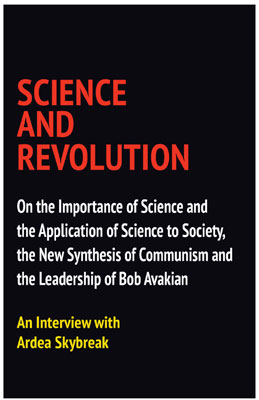
A lot of the students who came forward to make this program happen were deeply concerned about the oppression of Black people and the crimes of this system, but were also pursuing all sorts of directions and questions. We learned how much they agonize about the state of the world; yet many don’t really think you can actually change the world (even as they are deeply wrestling with the limitations of reform). We learned about the deep level of competition in academia and how questions of epistemology and morality are constantly crashing up against each other. We know that students are always channeled in the direction of choosing a career, but there’s so much struggle that goes on in that process as to “What kind of person will I be? (one that knows all these horrors are happening and turns the cheek or one who confronts these horrors and seeks to find a way to STOP them).”
The afternoon of October 7, I asked a student to speak (on the stage) about why he threw all in to make this program happen. He had forgotten he had class that evening and his professor threatened everybody that if they miss a class they basically fail the class. He deeply cared about stopping police terror, but he also felt that short of getting a career he could never really pursue his passion. We talked about the importance of science and why short of getting into BA and with the RCP you really can’t see the pathways for making revolution and emancipating humanity. He listened very closely and deeply struggled with what it means to passionately proceed from reality and ACT to change the world. He ended up coming a little late to the program but was deeply challenged by Carl Dix’s remarks.
The sponsoring organizations are involved in all sorts of NGOs (internships, etc.) and sometimes some of the students told me that they can’t sleep because of the horrors they hear: rape, torture, etc. and sometimes can’t swallow the positions they have to force people into to get a little bit of the crumbs of this system. One student has family in exile because of their ties in Central America. Revolution is not a new concept, but the possibility of an ACTUAL revolution and the emancipation of ALL of humanity is NEW. This further emphasized the need for students (and others) to do the work and get into BA and with the RCP. There are answers to these big questions and this is all part of opening up a new stage of communist revolution that they have to be part of; and it emphasized the need to be constantly going back and forth between these big questions and the struggle at hand, even when that struggle is as intense as this one was.
Less than two weeks to #RiseUpOctober
Another young woman has been pursuing her convictions that terror by police must STOP and has been organizing for #RiseUpOctober with a lot of creativity. She’s a recent graduate and has been wrestling with the question of accountability and how if one is really serious about STOPPING police terror, they have to be seriously organizing for #RiseUpOctober. And I thought her approach is correct in really putting it back to people: “If you’re not organizing for #RiseUpOctober, then you’re not serious about STOPPING POLICE TERROR.” In summing up, the national student task force found this to be very helpful because it puts forward very clearly what #RiseUpOctober is about, but it also allows people to raise their deeper disagreements of why they’re not throwing-in, and for us to go to work on that.
There’s so much more to sum up including the follow-up work off this program. But the lessons above should be part of how even in the next week or so people on campuses across the country can fight to have a major impact because of the crossroads we face in the fight to STOP Police Terror: applying a radically simple plan to bring together and organize scores of students. You can organize a program with speakers from your area; or you can organize a video showing of the program at Columbia. But whatever you do, remember what you represent... fight boldly for what needs to happen... and seek out, challenge, work with, and learn from those who want to see real change and are ready to learn about a whole new world in the process.
Volunteers Needed... for revcom.us and Revolution
If you like this article, subscribe, donate to and sustain Revolution newspaper.

